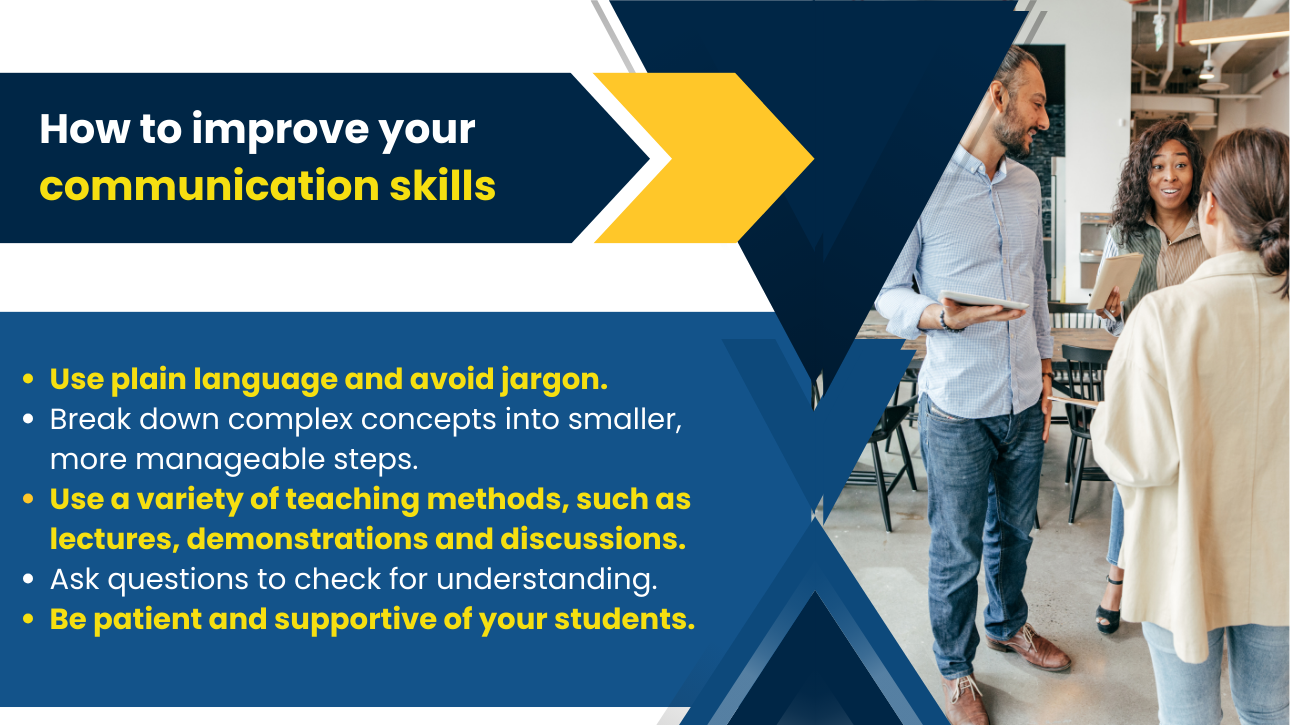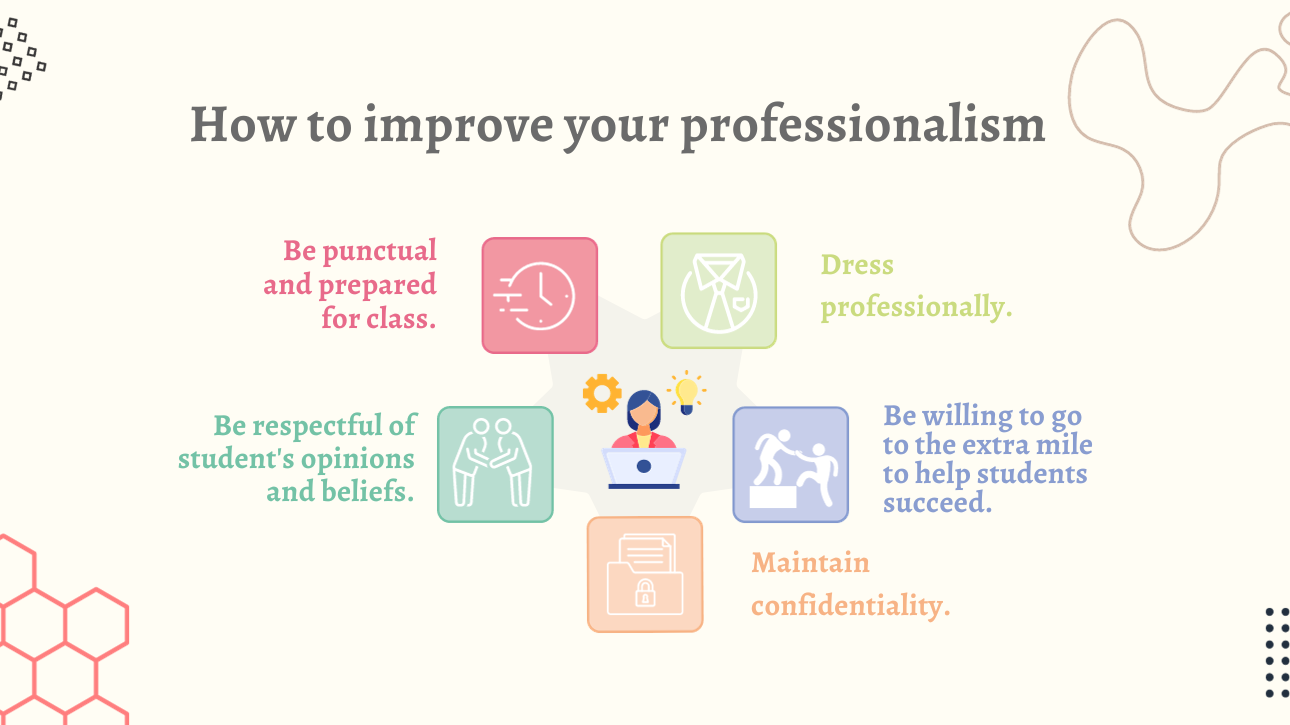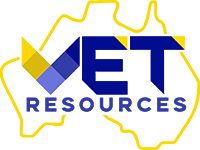You are a registered training organisation (RTO) trainer, you are committed to providing your students with the best possible learning experience. You know that meeting the ASQA requirements is just the beginning. To truly excel as a trainer, you need to develop and refine a range of skills that go beyond the minimum standards.
This blog post will explore some of the key skills that make an excellent trainer and assessor. We will discuss how to improve your communication, subject matter expertise, teaching, assessment and professional skills. We will also share some creative ideas for how to engage and motivate your students.
Whether you are a new trainer or a seasoned professional, there is always room for growth. By developing and improving your skills, you can become a more effective trainer and help your students achieve their learning goals.
Communication Skills for trainers and assessors
Trainers need to be able to communicate complex information in a clear and concise way. They also need to be able to listen to their students and understand their needs.
How to improve your communication skills

- Use plain language and avoid jargon.
- Break down complex concepts into smaller, more manageable steps.
- Use a variety of teaching methods, such as lectures, demonstrations and discussions.
- Ask questions to check for understanding.
- Be patient and supportive of your students.
Subject matter expertise for trainers and assessors
Trainers need to have a deep understanding of the subject matter that they are teaching. This allows them to answer student’s questions accurately and confidently.
How to improve your subject matter expertise
- Stay up to date on the latest developments in your field.
- Read industry publications and attend conferences.
- Network with other professionals in your field.
- Seek out opportunities to teach and mentor others.
Teaching skills for trainers and
Trainers need to be able to use a variety of teaching methods and techniques to engage their students and help them to learn.
How to improve your teaching skills
- Use a variety of teaching methods such as lectures, demonstrations and discussions.
- Tailor your teaching style to your students learning needs.
- Use real world examples and case studies to make your lessons more relevant.
- Encourage students to participate and ask questions.
- Provide feedback to students on their progress.
Assessment skills for trainers and assessors
Trainers need to be able to assess their students learning in a fair and accurate way.
How to improve your assessment skills
- Use a variety of assessment methods such as written exams, practical assessments and portfolios.
- Develop clear and concise assessment criteria.
- Provide students with feedback on their assessment results.
Professionalism for trainers and assessors
Trainers need to be professional and respectful in their interactions with students and colleagues.
How to improve your professionalism

- Be punctual and prepared for class.
- Dress professionally.
- Be respectful of student’s opinions and beliefs.
- Maintain confidentiality.
- Be willing to go to the extra mile to help students succeed.
Creative responses for trainer and assessors
One way to develop and improve your skills as an RTO trainer is to use gamification in your training sessions. Gamification involves using game design elements and principles in non game contexts. This can be great way to motivate and engage your students and to make learning more fun and effective.
Tips to use gamification in your RTO training
- Create a leaderboard to track student’s progress and reward them for their achievements.
- Use badges and certificates to recognise students for completing specific tasks or achieving certain milestones.
- Design challenges and quizzes that are challenging but achievable and that allow students to earn points or badges.
- Use role playing and simulations to give students hands on experience in real world scenarios.
- Create a community forum where students can ask questions, share resources and collaborate with each other.
By using gamification in your RTO training, you can make learning more fun, engaging and effective. This leads to better outcomes for your students and a more rewarding experience for you as a trainer.
Conclusion
In conclusion, the skills that make an excellent RTO trainer go beyond the ASQA requirements. Excellent trainers have strong communication skills, subject matter expertise, teaching skills, assessment skills and professionalism. If you are a registered training organisation trainer, there are many things that you can do to develop and improve your skills. You can read books and articles on teaching and assessment, take professional development courses, and observe other experienced trainers. You can also seek out opportunities to mentor new trainers and to share your knowledge and expertise with others.
By developing and improving your skills, you can become a more effective RTO trainer and help your students achieve their learning goals.
Want to know about high quality training materials?
At VET Resources we offer the highest quality training materials to RTOs. We host informative webinars and offer free consultations for RTOs to stay ahead of their competitors. Contact us now!
Frequently Asked Questions
What are the four requirements that a vocational trainer and assessor must hold to be able to deliver and assess in the VET sector?
A
- Vocational competencies at least to the level being delivered and assessed.
- Current industry skills directly relevant to the training and assessment being provided.
- Current knowledge and skills in vocational training and learning that inform their training and assessment.
- A current training and assessment qualification – TAE0116 Certificate IV in Training and Assessment or higher.
How can I be a good trainer and assessor?
To be a good trainer and assessor:
- Have a deep understanding of the subject matter you are teaching and assessing.
- Be able to communicate complex information in a clear and concise way.
- Be able to use a variety of teaching methods and techniques to engage your students and help them learn.
- Be able to assess students’ learning in a fair and accurate way.
- Be professional and respectful in your interactions with students and colleagues.
What trainer competencies are required?
The competencies cover a range of topics including planning and preparing training and assessment sessions, delivering training and assessment sessions, assessing students learning and providing feedback to students.
How much does a trainer and assessor get paid in Australia?
The salary of a trainer and assessor in Australia varies depending on a number of factors such as their experience, qualifications and the industry in which they work.
What is relevant industry experience for a vocational technical skills trainer?
Relevant industry experience in a vocational technical skills trainer is experience working in the field that the trainer is teaching. For example, a trainer who is teaching a course on automotive repair should have experience working as an automotive mechanic.
What is relevant professional development for a vocational technical skills trainer?
Relevant professional development for a vocational technical skills trainer is professional development that is related to the field that the trainer is teaching. For example, a trainer who is teaching a course on automotive repair could take professional development courses on new automotive technologies or new teaching methods.
What evidence of work should a vocational skills trainer provide?
Evidence of work that a vocational technical skills trainer could provide includes:
- Lesson plans
- Students evaluations
- Sample of student work
- Letters or recommendations from former employers or colleagues
- Portfolio of evidence
What variety of sources should a vocational technical skills trainer use to develop their training materials?
A vocational technical skills trainer should use a variety of sources to develop their training materials such as real world examples, videos, websites, articles, textbooks and industry standards.
What is a portfolio evidence and why is it important for a vocational technical skills trainer?
A portfolio of evidence is a collection of materials that demonstrates a trainer’s skills and experience. It is important for vocational technical skills trainers to have a portfolio of evidence because it can help them to get hired and to demonstrate their qualifications to potential employers.
What are current industry practices?
Current industry practices are the methods and techniques that are currently being used in a particular industry It is important for vocational technical skills trainers to stay up-to-date on current industry practices so that they can teach their students the skills that they need to succeed in the workplace.
What are enterprise trainer skill set?
Enterprise trainer skill set is the combination of skills and knowledge that is required to be an effective trainer in a corporate setting. Enterprise trainers typically have strong communication skills, presentation skills and instructional design skills.
What is the time of employment and currency of knowledge for an effective trainer?
The time of employment and currency of knowledge for an effective trainer is the amount of time that the trainer has worked in their field and the level of up-to-date knowledge that they have. Effective trainers typically have several years of experience working in their field and make an effort to stay up to date on latest trends and developments in the field.
What are high level delivery skills for an effective trainer?
High level delivery skills for an effective trainer include the ability to present information in a clear and concise way. Engage and motivate students by using a variety of teaching methods and techniques. An effective trainer assesses students learning effectively.
What are effective engagement techniques?
Effective engagement techniques are methods and techniques that trainers can use to keep their students interested and involved in the learning process.
What are industry engagement techniques and activities?
Industry engagement techniques and activities are methods and techniques that trainer can use to keep their training materials and methods relevant to the current industry practices.
Disclaimer:
The information presented on the VET Resources blog is for general guidance only. While we strive for accuracy, we cannot guarantee the completeness or timeliness of the information. VET Resources is not responsible for any errors or omissions, or for the results obtained from the use of this information. Always consult a professional for advice tailored to your circumstances.






